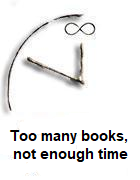One of the things Campbell excels at is capturing the atmosphere of a grotty run-down urban environment populated by grey run-down people, and this is no exception. Even at the outset Ingels is sleep-deprived, a local newspaper journalist churning out dull articles each day about provincial events that don’t matter. In the background there’s the news that a mysterious wandering planet is passing through the solar system, but it doesn’t affect day-to-day life, so Ingels barely gives it any notice. Besides, looking up at the sky makes his migraine worse.
The editor sends him out to cover a local art installation. When he reached the exhibition he walked straight past it. Returning, he peered at the address on the ticket. My God, this is it. Two of a street of dingy but tenanted terraced houses had been run together; on the front of one, in lettering he’d taken for graffiti, were the words LOWER BRICHESTER ARTS LAB.
Most of the pieces are uninspired post-modernism, but one is a painting of a blackened green-tinged city shouldering up from the sea. Ingels realizes he once saw exactly the same city in a dream, and remembers walking its damp streets. All he learns about the origin of the painting is that it came from a free-association exercise to deliberately empty one’s mind.
Ingels is aware he still dreams; the first line of the story has him waking up knowing that he had been dreaming, but unable to remember any of its substance. After the art exhibit he dreams of the city again, feeling the presence of dormant beings within his walls. And as the mysterious planet comes closer and closer, Ingels’s dreams grow increasingly vivid, and he abandons his newspaper work for some inquiring of his own. There must be a reason why he’s started to dream about an abandoned theatre in Birchester, and why, when he was much younger, his father confessed to having dreamt of the same sunken city…
The Tugging by Ramsey Campbell
Availability: print
Word count: 9,700
First published: The Disciples of Cthulhu, edited by Edward P. Berglund, 1976, DAW Books
Where to find it: Cold Print, collection, 1987, Tor
The Book of Cthulhu, edited by Ross E. Lockhart, 2011, Night Shade Books
